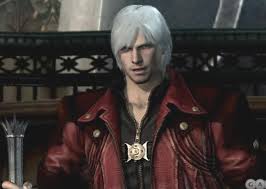Kat – DmC’s Resident Medium
While white-haired, trash-talking, unflappable demon hunter Dante (of the Devil May Cry videogames) is a natural loner, he’s not alone in his fight against the demon hordes. Usually he shares the spotlight with a few unique women who just happen to be knockouts both in body and the battlefield. And though Dante is hinted to be a womanizer due to his charisma and confidence so key to his laidback personality, very few of those relationships are romantic. Chief amongst those precious few is Kat, Dante’s comrade in the DmC reboot. Does Dante even have a shot with her? Read on.
Dante and Kat work well together because of their similar pasts. Dante’s childhood was one trip from orphanage and juvenile detention center after another, each worse than the last. Every day of his life Dante had to fight for his life against the demons within the institutes, abusing Dante because of his demon father Sparda’s betrayal (marrying the angel Eva and fathering Nephilim, the only beings capable of destroying the tyrannical Demon King Mundas). So it’s safe to say Dante has trust issues.
Kat’s trauma is described by hints and implication. As a psychic medium Kat has access to Limbo, the demons’ hellish home dimension. Growing up, Kat escaped the horrors of everyday life by dwelling in Limbo. And Limbo is about as unbecoming a sanctuary as walking in a bad neighborhood at the dead of night. Think about it. If Limbo is Kat’s haven, then her normal life must be all kinds of bad.
They’re diametrically opposites: Dante takes the fight to the demons; Kat gets him out when the shit hits the fan. They’ve literally put their lives in each other’s hands. The bond they develop, to be vulnerable without reproach, having a kindred spirit to lean on . . . it’s what keeps them going in the face of abject failure.
That’s not to say that Kat’s incapable of romance. Her relationship with Dante’s twin brother Vergil is far more than platonic. Vergil saved Kat from Limbo demons, offered her a position within the Order (the resistance against Mundas). Vergil gave Kat a purpose when she had none. Because of that her loyalty is unquestioned. She endured immense torture when captured by Mundas’ demons, yet she never divulged Vergil’s Nephilim existence. She’d do anything for him.
Unfortunately, all that changes at the game’s end. After all that talk of freedom, Vergil reveals his true agenda to rule over mankind. When Dante points out that Kat – a human, one of the mindless sheep – had just a great a role in their victory over Mundas – Vergil responds with “[She] was useful.” Vergil never really cared about Kat; just her potential and her role in his scheme.
And even after that, Vergil still means something to Kat. In a twist of irony, she talks Dante out of killing Vergil. And when Dante questions his own existence, it’s Kat that reassures him that he’s the same Dante that he always was. After everything they’ve been through, it’s not hard to imagine them as lovers.
Dante is a loner. But he’s never really alone. In each game he has allies – coincidentally often beautiful women – to rely on. Though Dante has plenty of chances, the romantic possibilities are merely heresy. Kat may be the only one to go beyond the platonic relationship. It’ll be interesting to see that develop if ever a sequel is made.
After all, stranger things have happened.








